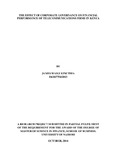| dc.contributor.author | Kinuthia, James W | |
| dc.date.accessioned | 2014-11-14T09:22:36Z | |
| dc.date.available | 2014-11-14T09:22:36Z | |
| dc.date.issued | 2014-10 | |
| dc.identifier.citation | Master of Science in Finance, University Of Nairobi 2014 | en_US |
| dc.identifier.uri | http://hdl.handle.net/11295/74873 | |
| dc.description.abstract | Good corporate governance is to help firms gain access to foreign capital and foreign
companies tend to gain investment opportunities providing portfolio diversification
opportunities. It is also viewed that with good corporate governance practices a firm’s
performance is greatly improved. This study was guided by the main objective which was
to establish the effect of corporate governance on the financial performance of
telecommunication firms in Kenya. This study was based on an exploratory design. A
quantitative method was used in data analysis. The target population was the four
telecommunication firms in Kenya which are known as NFP Tier 1 and identified as
national operators. The study used secondary data which was collected from various
sources. For the financial analysis the data collected was from their financial statements.
Findings on the relationship between corporate governance variables and ROA indicated
significant negative relationship. Board composition plays a crucial role in the financial
performance of the company. The study findings indicated that there was significant
negative relationship between board size and ROA which implied that large boards lead
to low ROA of the firms under study. Similar trend of negative relationship was observed
between the leverage and the board size, board composition and the size of the company.
A strong relation was observed between ROA size of the company and the board size as
indicated by the correlation coefficient and this implied that the larger companies
experienced higher ROA as well the larger board size led to a higher ROA which is in
contrast to the company’s leverage which was influenced negatively. The coefficient of
determination (R2) indicated that 68.9% of change in return on asset was accounted
for by the explanatory variables while the adjusted R-squared of 57.8% further
justifies this effect. Thus some variables excluded from the study accounted for the
remaining 31.1%.
Firms leverage was critical in determination of its return on assets. Board composition
(Ratio of non-executive directors against total board members) had a positive relationship
to the ROA of the firms and thus firms should increase their boards’ composition for
better corporate governance. The leverage (Book value of debt divided by book value of
total assets) led to lower ROA of the firms and thus the firms should limit the amount of
the debts. From the findings on the effect of board size on financial performance which
was negative and for boards to be effective in performing their roles, there is need to
review the numbers of board members to avoid having large boards for all of the
telecommunication firms in Kenya as well as other firms not under the study. On the
firms’ board composition, the firms should increase their number of non-executive
directors against total board members as well as gender as this would ensure compliance
with better corporate governance principles and this would lead to a better financial
performance | en_US |
| dc.language.iso | en | en_US |
| dc.publisher | University of Nairobi | en_US |
| dc.title | The Effect of Corporate Governance on Financial Performance of Telecommunications Firms in Kenya | en_US |
| dc.type | Thesis | en_US |
| dc.type.material | en_US | en_US |

